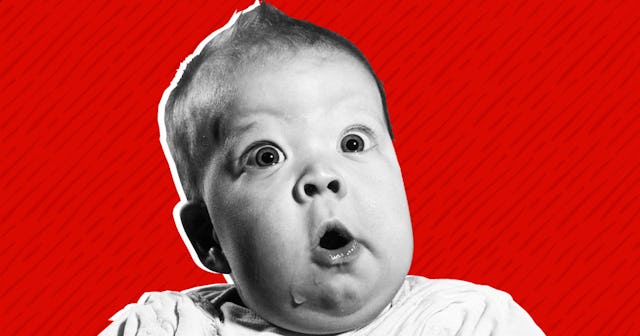These Banned Baby Names Will Leave You Speechless

We Americans get pretty creative with our baby names (um, five babies were named Zzyzx last year, you guys). And luckily for us, and our love of unique names — here’s looking at you, Kardashians — we’re allowed to name our babies virtually anything we want, within reason. There’s no choosing from a predetermined list of acceptable baby names, or sticking to only certain letters or ethnic origins.
Of course, you can’t name your baby Zoë or José or other accented names, but that’s just because our current computer system doesn’t recognize the diacritical marks. For the most part, though, our baby naming laws in the United States are fairly relaxed, only following a few common-sense guidelines.
In other parts of the world, though, it’s a little more difficult to give your baby a unique name. Laws vary widely from country to country and culture to culture, but here are some of the most prominent international baby naming taboos.
1. No Unisex Baby Names.
While gender neutral baby names are all the rage here in the States, there are many places where they’re banned: Denmark, Portugal, Iceland, and Finland, to name a few. In 2013, an Icelandic girl had to go to court because her name, Blaer, was considered by authorities to be unfeminine. She did win, though, clearing the path for future female Blaers.
2. If It’s Not On The List, It’s A No-Go.
If you live in Hungary, Norway, Portugal, Iceland, Saudi Arabia, Tajikistan, Denmark, or Azerbaijan, you must choose your baby name from a specific list of pre-approved names. Many of these countries will allow exceptions, but rarely; they’re few and far between.
3. Titles? Nope.
New Zealanders aren’t allowed to name their babies anything that could be constituted as a prestigious title: i.e., Duke, Justice, etc. And it’s the same story for Saudi Arabian parents, who cannot give their children names such as Amir, which means “prince,” or Malika, which means “queen.”
4. It’s Not In Our Alphabet, Sorry.
Giphy
In places with specific characters or alphabets, parents are typically banned from using names that feature “outside” characters. In China and Japan, for example, only official Chinese characters and Japanese kanji are allowed. And in Iceland, names must include only letters from the Icelandic alphabet. They have some that we don’t — like “þ” — but seeing as there’s no C in their alphabet, names with that letter aren’t allowed. Just ask the rebellious Icelandic parents who tried to name their son Duncan. It’s the same with Q and W.
(Interesting fact: While Hawaii now follows the same generally-flexible naming rules as the rest of the United States, its traditional cultural names such as Ailani and Keanu only include letters from the Hawaiian alphabet, which consists of just five vowels and seven consonants.)
5. An English Name? Get Outta Here.
Similarly, many countries don’t allow Anglicized versions of names. For example, in Portugal, you’re not allowed to name your son Phillip, but Filipe is A-OK. In Hungary, Stephen is no good, but Stefán is permitted. In Morocco, you can’t name your daughter Sarah, but its Arabic version, Sara, is allowed.
6. Surnames? Nah.
While here in the States we’re keen on using last names as first names — think Carter, Bailey, Logan, and Wyatt — it’s a no-no in Norway, where you can’t name your baby anything that’s registered as a surname there.
7. Don’t Be Getting Religious, Either.
Many countries don’t allow names that could be considered blasphemous or disrespectful to their respective religions. Saudi Arabia, in addition to those royal titles mentioned above, says you can’t name your child something like Malak, which means “angel.” In Switzerland and Spain, you can’t name your baby after Biblical villains, so Judas is nixed. In Germany, you can’t name your baby Lord. And Australians can’t use Bishop or Saint. (So if we had these sorts of laws in the U.S., little Saint West may not be a Saint at all, celebrity parents be damned.)
8. And Be Sure To Spell It Right.
Giphy
In Denmark, an odd or unique spelling can be grounds for having even the most mundane-sounding baby names tossed out. A couple of examples are Ashleiy and Jakobp.
Aside from these rules, with a few exceptions, the rest of the world is pretty much on the same page with the U.S. in terms of what you can’t name your baby; basically, symbols or punctuation, anything that would be deemed to cause extreme discomfort or ridicule, or things that are profane or pornographic.
But that doesn’t stop parents from trying. Here are a few actual banned baby names from around the globe:
Saudi Arabia:
Alice, Linda, Johnny, Maya
Denmark:
Monkey, Anus, Pluto
France:
Nutella, Mini Cooper, Prince William, Deamon
Norway:
Elvis, Superman, Ikea, Brfxxccxxmnpcccclll mmnprxvclmnckssqlbb11116 (which the parents said was to be pronounced “Albin”). Metallica was once on this list, but was finally allowed after a seven-month court battle.
Japan:
Akuma (“devil”)
Malaysia:
Chow Tow (“smelly head”), Woti (“sexual intercourse”), Sor Chai (“insane”), Khiow Khoo (“hunchback”)
Mexico:
Facebook, Rambo, Batman, Hermione, Escroto (“scrotum”), Robocop, Circumcision
New Zealand:
Talula Does The Hula From Hawaii, Lucifer, Sex Fruit, Anal, 4Real, Fish And Chips
Now, we’re all for expressing individuality through your name, but what kind of person literally wants to name their child after a butthole? Parents like these are (mostly) why baby naming laws are put into place.
It sucks to be told what you can and can’t name your baby, but then again, I guess it’s a blessing in disguise for the would-be Anuses of the world.
Browse thousands of choices to find your perfect (and perfectly legal!) baby name in the Scary Mommy baby name database!
This article was originally published on